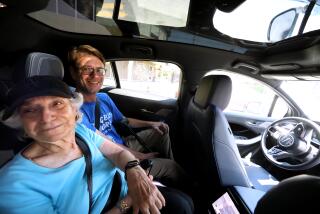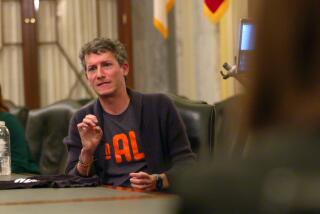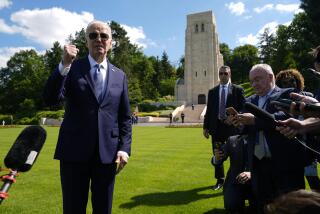‘Alive Inside’: This isn’t your grandkids’ viral video -- or iPod
This post has been corrected. Please see note at bottom for details.
KANSAS CITY, Mo. -- Maybe Nicki Minaj will help save us from Alzheimer’s someday.
A YouTube video now making waves features an elderly man in a nursing home who doesn’t recognize his daughter when she greets him. His name is Henry and he’s slumped over in his chair. He barely answers questions. Then someone gives him an iPod and everything changes. He begins to dance in his seat. He hums along with the music.
After listening, Henry lifts his eyes and begins to gush about his love for jazz singer and bandleader Cab Calloway — and then begins to sing in a rich baritone with vibrato.
A man in the video asks, “What does music do to you?”
“It gives me the feeling of love, romance,” Henry responds, lighting up. “I figure right now the world needs to come into music, singing, you’ve got beautiful music here. Beautiful, oh lovely! And I feel [a] band of love, of dreams.… The Lord came to me, made me a holy man, so he gave me these sounds.”
In one of those strange quirks of the Internet, the clip -- a rough cut from the documentary “Alive Inside” -- sat virtually dormant online for four months. It had about 300 hits before a Reddit user discovered it Friday and sent the video viral. It now has more than 350,000 hits.
The documentary itself is about the Music & Memory project, a New York nonprofit that donates iPods to nursing homes and raises awareness about music as a form of therapy. It hasn’t even premiered yet. That’s scheduled for Wednesday, April 18, at the Rubin Museum in New York.
But if the video’s comments are any indication, the Music & Memory project is having an impact.
“My grandfather is fighting with Alzheimer’s right now,” one commenter wrote. “I think this is something I’m going to try with him as he’s starting to become more and more confused.”
In many ways, the video landed at just the right time.
It’s pretty common — often with ageist undertones — for those more adept with technology to ha-ha that older generations don’t really grasp “the Google.” After all, dozens of hecklers retweet Sen. Charles Grassley every time he sends a Twitter update that looks like a ransom note from his iPhone.
But technology typically associated with rotting teenagers’ brains is showing enormous potential for older people. Nursing homes use Wii systems to help seniors get exercise, and iPads can make small fonts bigger for easier reading.
The documentary’s director, New York-based Michael Rossato-Bennett — who said the project had no ties to Apple, lest anyone thought the video was an ad — called the use of music in nursing homes a “a good story about a subject that has no good stories in it.”
“We’ve been trying to find a cure for Alzheimer’s for years, and we’re not any closer, and there’s not a single drug that does anything for Alzheimer’s,” Rossato-Bennett told The Times. (The Alzheimer’s Assn. says drugs can’t stop or slow Alzheimer’s, only alleviate symptoms.)
“If this is your lot in life, or the lot of one of your family members, it’s a dark road … and if music can open the back door of the human brain and if it can awaken parts of the brain that are ‘perfect’ for these Alzheimer’s people, that is the most amazing gift in the world for these people.”
The burgeoning discipline of music therapy — which usually involves a therapist, unlike in the video — has produced a raft of studies touting the benefits of music as treatment. A 2009 French study on Alzheimer’s patients, for example, found that music therapy helped alleviate anxiety and depression up to eight weeks after treatment was discontinued.
But a 2010 review of the existing research said there still hasn’t been enough research to show whether music therapy is a valid treatment for older patients with dementia.
Dan Cohen, executive director for Music & Memory, isn’t dissuaded. He said the anecdotal evidence from people who work in nursing homes has been obvious. And, he said, the response to the video has been overwhelming — especially given that it’s about healthcare, a subject that rarely goes viral online.
“I have people from around the country -- Oregon, California, Georgia, Maine, Nebraska -- saying, ‘How can I do this? I’ve watched this a few times and I’m still crying,’ ” Cohen told The Times.
The Music & Memory site features how-to guides for home setup, and Cohen says that those interested in supporting the project can also donate iPods. His goal is to have a program set up in every nursing home in the U.S.
“Everybody wants to do this because it’s an easy thing to do,” he said of the response. “It’s been very inspiring. I’m having a great time with this.”
For the record, 12:39 p.m., April 12: An earlier version of this post stated that the documentary would premiere Wednesday, April 21. The correct date is Wednesday, April 18.
ALSO:
Creationism discussions are now OK in Tennessee schools
Springfield, Ore., revealed as ‘Simpsons’ hometown. Sort of.
Free wedding, now free jail time? Bride accused of faking cancer
Twitter.com/mattdpearce
More to Read
The biggest entertainment stories
Get our big stories about Hollywood, film, television, music, arts, culture and more right in your inbox as soon as they publish.
You may occasionally receive promotional content from the Los Angeles Times.











